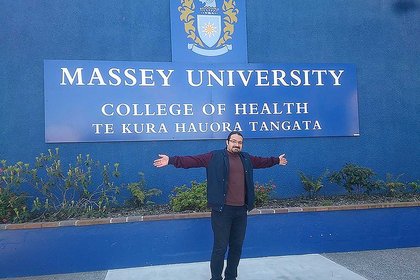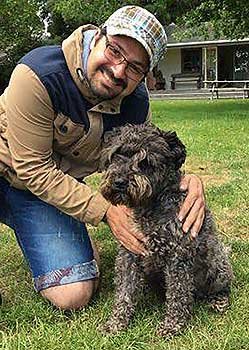
PhD student Ali Heydari is studying with the College of Health, at the Wellington campus.
Thirty-three-year-old Ali Heydari fell in love with bacteria early in his Bachelor of Science degree at Bu Ali Sina University.
The PhD student from Hamedan, a city the size of Wellington in western Iran says “The world of microbes, is a kind of wonderland for me. In microbiology you may find something novel every day that nobody has found before, and this is what I love.”
Mr Heydari continued to pursue his interest in microbiology and gained a Master of Science in plant bacteriology. He researched alfalfa wilt disease caused by different bacterial species and to expand his skills in bacteriology he also researched soil bacteria, their ecology, diversity and their drug resistance.
In 2013, Mr Heydari migrated to New Zealand when his wife started her PhD at Victoria University, in the field of Biomedical Genetics. A few months after arriving in Wellington, he was offered a research job at the Massey Institute of Food Science and Technology (MIFST). He also applied for a PhD position and was able to get a College of Health scholarship to start his research.
“I decided to do my PhD at Massey because it is the leading university in New Zealand in the field of agriculture and environmental sciences.”

Mr Heydari and his dog Kambiz.
His thesis, entitled ‘Molecular Aspects of Horizontal Gene Transfer and Resistance Mechanism Induced by Heavy Metals in Bacterial Isolates’, is a continuation of the work he did as a research assistant for MIFST. The project explores the resistance of environmental bacteria to heavy metals and subsequent selection for antibiotic resistance.
Since heavy metals are toxic for living cells, environmental bacteria exposed to these metals can gain resistance to them as a survival strategy, he says. Bacteria showing resistance to heavy metals can develop resistance to a range of antibiotics as well.
“Without antibiotics we would go back to the period before Alexander Fleming discovered penicillin. That’s why this project is so important; the results could help to develop better strategies against high accumulation of heavy metals in New Zealand soils and subsequent microbial antibiotic resistance.”
As well as being kept busy with his studies, Mr Heydari and his wife Mona have a seven-month-old baby girl, Rebecca.
“I am experiencing fatherhood for the first time and am really enjoying it, although my work load has increased significantly.”
Upon completion of his PhD, Mr Heydari would like to do a postdoctorate to enhance his experience in the field. He hopes to one day work for the Ministry of Primary Industries or a research institute such as AgResearch, the Institute of Environmental Science and Research, or Scion.
Mr Heydari’s PhD thesis is being supervised by Dr Barry Palmer, Dr Nick Kim, Dr Collette Bromhead, Dr Jacqui Horswell, all from the School of Health Sciences, and Dr Gerty Gielen from Scion, Rotorua.